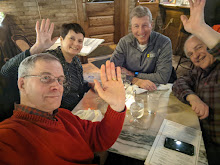It's impossible to watch the Macy's Thanksgiving Day Parade each year without thinking back to two years I wish I could do over. The parade at that time went down Broadway, and I worked on the 5th floor of 1440 Broadway, at the RKO Radio Network. Thanksgiving was a good time for our families to come into the sports department and watch the balloons go by at eye level (The image above is the 1985 parade from the vantage point). I was usually working in the windowless newsroom, so I never really got to see the parade.
It was 1984 when I moved to New York. The radio news business was different then. There was a "nuclear core" of the industry. If you worked in the news business, you wanted to get to New York. It's what motivated radio newspeople in small markets all across America.
I'd worked at WHDH in Boston, which was the only dream in broadcasting I ever really had -- Boston -- but much of the newsroom was laid off in May, even though we were the #1 station in the market. My old boss, Ed Bell, helped me get a "summer relief" job at WCVB in Boston, which at the time was known as the best local TV station in America. It was an honor richly deserved.
But I never felt comfortable in TV; I couldn't understand the entire "write to the pictures" method of writing, and I never could figure out the union duties and who could do what. In radio, you controlled the story from the beginning all the way to the end. It doesn't work that way in TV.
So when RKO's managing editor, Harvey Nagler, called -- presumably at the behest of my old WHDH pal Nick Young-- I jumped at the opportunity to fly down to New York and check out a "WGA" position (Writer's Guild of America). Basically, WGAs called people and interviewed them, sliced up the tape, and sent it out to the anchors. Also involved was an editor's shift or two. No heavy lifting, really.
I was hired and we moved to New York where we were immediately depressed by the apartment market. We were moving away from families and New York then seemed far away from Massachusetts. I wish I'd known then what I know now.
I loved taking the train into the city, I loved the Empire State Building at night, I loved being around the best of the best, and I loved reading some of the finest writing I've ever seen come out of an anchor's hands, but while I thought $43,000 was a lot of money, in New York it was chump change. We couldn't really afford to do anything to enjoy New York.
On the second day of work, RKO was reported to have double-billed advertisers in its 1984 Olympics coverage. It would have to repay it and everyone knew that money had to come from somewhere. Its owner, General Tire, was already known as a corporation that wasn't qualified to own broadcast facilities in the country (this was back when the FCC gave a damn about the character of the people who ran broadcast stations). Over the summer that number grew into the millions.
Every week, another story came out about the future of the RKO Radio Networks, given the collapsing finances of General. And I liked job security (which is why my decision to get into radio wasn't that bright to begin with). The stench of death was in the air constantly and I don't deal with that well, not being that optimistic a guy for one. Being a stupid 30-year-old with a new baby at home for another.
When the layoffs start happening, Nagler called me into his office. I thought it was the end. "Are you worried about losing your job?" he said.
"Yes," I said.
"Don't be," he said.
Still, I sent resumes out. I wanted to go work at ABC News, but nothing developed. At the same time, I was working with people I admired tremendously. They were professional. They were fun. It looked easy for them. And I was out of my league.
A year later, just before 5 on a Friday night, a memo was circulated. We'd been sold to Dick Clark and the Transtar Radio Network, which distributed syndicated music specials. I, and a lot of other people, knew that they weren't interested in running a news operation (which was renamed the United Stations Radio Network). they were interested in the satellite transponders RKO owned, and the affiliate lists.
In the spring of 1986, my father-in-law asked me to come back to the Berkshires to help start an FM station in a license battle the company was involved in. For two years, I'd heard some frustrated RKO anchors say, "I'd like to go back to run a small-market radio station," and given the opportunity now, it seemed like a no-brainer (it's the hardest thing in the broadcating business, I know now, but that's another story).
After I gave my notice, ABC News called and the news director said, "I just now saw your resume and I think we need to talk." But it was too late.
As it turned out, leaving New York has worked out well, and yet I regret I wasn't smart enough, good enough, or adult enough to be better at it.
A year or so later, we had a reunion on Long Island. It was great fun to see everyone again. As we were leaving, Ross Klavan, an anchor I was saying goodbye to laughed at one point and said, "We were glad to see you go."
I laughed too, even if it was the worst thing anyone has ever said to me.
And even though he was right.
Thursday, November 25, 2010
Subscribe to:
Post Comments (Atom)


No comments:
Post a Comment